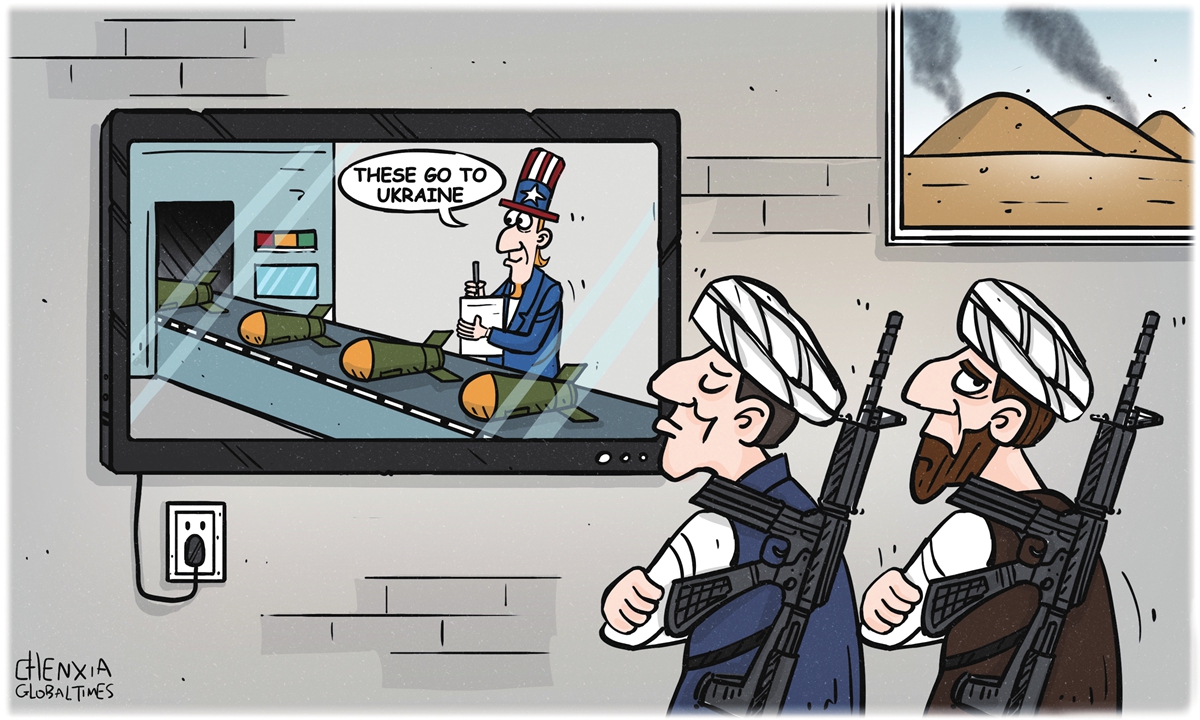
Ukraine Afghanistan Illustration: Chen Xia/GT
Washington is pouring money into Ukraine, both in terms of weapons and ammunition and economic assistance. The $40 billion authorized by the US Congress in May is a sizeable sum, especially for a country dealing with record-high inflation and national debt that has spiraled out of control.
None of that seems to matter for the White House, which has pledged to back Ukraine with as much as they've got, for "as long as it takes." The very future of the "liberal world order" depends on Kiev's victory, declare armchair pundits on Twitter and echoed by hawkish members of Congress.
The idea, outlined by everyone from President Joe Biden on down, is that Western economic sanctions will crash the Russian economy while Moscow's military will be bled dry fighting the Western-trained and -equipped Ukrainians. A keen observer of Washington's political scene will easily recognize the source of this strategy: a conviction by the US establishment that the Soviet Union was brought down by the one-two punch of the war in Afghanistan and military expenditures to match the West in a global arms race. This version of the West's Cold War "victory" is not even up for debate in the US, it's simply taken for granted.
On Friday, the White House announced the dispatch of $270 million worth of military aid, including more HIMARS rocket artillery launchers and "Phoenix Ghost" suicide drones, the latest "miracle weapons" that are supposed to achieve victory for Ukraine. Such labels were previously bestowed on Javelin anti-tank missiles and Stinger anti-aircraft launchers, sent to Ukraine in February and March. The Stingers had this reputation carry over from Afghanistan, where the US provided them to Islamic militants fighting against the Soviets.
While the US strategy for arming the Ukrainians seems partly based on the "logic" of arming the Afghan mujahedin in the 1980s, the way Washington's gradual increase of funding to the operations of the government in Kiev is more reminiscent of another Afghan adventure - America's own 20-year occupation, which ended ignominiously last year.
Since the American public seems to have forgotten all about it, perhaps a reminder is in order.
The US sent troops to Afghanistan in October 2001, shortly after the 9/11 terrorist attacks. What was supposed to be a quick war of vengeance turned into a 20-year open wound on the American budget. The Taliban was ousted quickly, but it took a decade to track down and kill Bin Laden - in nearby Pakistan. Even then, the US would not declare victory and go home, as the Taliban were on the rise again in response to the US occupation. In the never-ending struggle to defeat the insurgency, the government in Kabul had most of its budget funded by the US and its allies, while the Pentagon paid the salaries and weapons expenses of the "Afghan National Army."
On July 8 last year, Biden told Americans that the last US troops would leave Afghanistan by the end of August 2021. When asked if the Taliban takeover was inevitable, he famously replied, "No, it is not," insisting that the Afghan Army is as well-equipped as any army in the world."
Within a month of Biden's defiant statement, the Taliban were at the gates of Kabul and the Pentagon was leaking to major US media outlets that the Afghan capital could fall in 30-90 days. In reality, it took only five.
On August 15, the Afghan government melted away and Taliban took control of Kabul virtually unopposed. The original plan to calmly fly US diplomats and civilians out of the country turned into a mad scramble.
Images of men clinging onto the departing planes, falling off to their doom, made rounds on social media. The Pentagon sent thousands of US Marines to secure the airport - not from the Taliban, but from the human tide of Afghans seeking to escape. In the end, some 110,000 people were evacuated, but thousands of actual army translators and civilian contractors were left behind.
The last US plane took off from Kabul just before midnight on August 30, 2021. In a speech on the following day, Biden called the airlift an "extraordinary success" and said it was the end of US attempts to "remake other countries". From now on, he said, Washington will "set missions with clear, achievable goals, and stay focused on fundamental national interests.
Less than six months later, the very same Biden would be mobilizing US allies for a confrontation with nuclear-armed Russia, while writing blank checks to Kiev! As of July 22 this year, the Biden White House has sent $8.2 billion worth of weapons to Ukraine.
In May, around the time when the US Congress approved a $40 billion Ukraine aid bill, the Pentagon quietly admitted that some $7.1 billion worth of US weapons and equipment sent to Afghanistan had been left behind in Taliban hands.
The author is a Serbian-American journalist. opinion@globaltimes.com.cn




